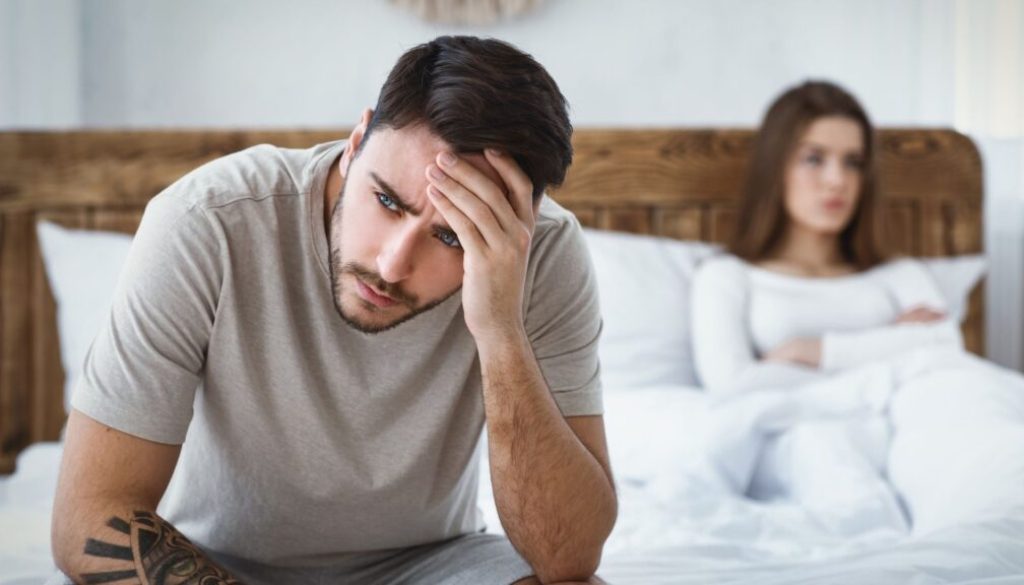Psychological Reasons of Premature Ejaculation

Last updated on December 12th, 2022 at 04:46 pm
Having continuous experience of premature ejaculation during a sexual experience?
You might want to look through the psychological perspective.
Usually when having difficulties in sexual performance or sexual dysfunctions, one often thinks it is due to physical conditions.
It is true that physical conditions such as diabetes, heart disease, pelvic floor disorders or hormonal imbalance, neurological issues, and other chronic conditions can contribute to sexual dysfunctions, but the impact of mental health on sexual function should not be ignored.
Men may experience difficulties in sexual performance through premature ejaculation and erectile dysfunction.
Sexual Problem in Nepal: Premature ejaculation (PE)
One frequent sexual problem in Nepal is premature ejaculation. One in three persons claims to experience it occasionally.
Around 30 men from 18 to 59 years old have issues with PE, but because of shame and embarrassment, it stops men from discussing this topic and asking for help.
They experience PE when semen leaves the body during sex before it is intended.
If PE doesn’t occur frequently, it’s not a problem.
Men with generalized and persistent PE score worse in regard to sexual control and pleasure and higher in terms of discomfort, social anxiety, and harm avoidance (excessive worrying).
Fortunately, since PE is both psychological and biological, there are a variety of medications, sexual techniques, and therapeutic options available to delay ejaculation, which may improve sexual satisfaction and intimacy.
Psychological causes

Premature Ejaculation could be due to these psychological reasons:
- Depression or anxiety, particularly about performance
- Feeling anxious about rejection by a sexual partner
- Expecting failure
- Negative sexual experiences in childhood
- Strict upbringing
- Stress
- Problems within the relationship
- Worrying about premature ejaculation
- Early conditioning
Other factors that can play a role include:
Anxiety
PE and anxiousness frequently go hand in hand. The basis of the anxiety could be worrying about one’s sexual performance or other issues.
Relationship difficulties
Early ejaculation can be caused by relationship issues.
This could be the case if you’ve had sexual encounters with other partners where PE did not occur frequently.
Feeling anxious about rejection by a sexual partner
The first step is to discuss the issue. Counseling for couples or sex therapy may be beneficial. As it can cause loss of connection or satisfaction in your relationship. Behavior therapies such as squeezing therapy may be helpful to the last election (see the treatment details below).
Strict upbringings
When a man has been raised to view sexual intercourse as a shameful act, viewed as a sinful and unclean act that should be avoided. Or it can only be done due to religious reasons such as having children.
Early conditioning
One’s past sexual behavior often will affect his present and future sexual experiences, such as ejaculating rapidly when the man is young, a teenager avoiding detection of masturbation, or can be having fear of being found having sexual intercourse.
In order to reach a fast climax and finish the deed, the male accelerates the sexual act, however, this has an unfavorable outcome.
It causes the male to develop a habit of acting in this way, which causes early ejaculation. Once a behavior has been ingrained, it can be quite challenging to break it.
Treatments
Psychological therapy, behavioral therapy, and pharmacologic treatments are the major ways to treat PE.
For premature ejaculation, you must consult with an Andrologist, Psychiatrist, or Endocrinologist in analyzing the best treatment plan for you, depending on the psychological or biological reasons (sometimes a mixed approach may also be taken).
Biological or other factors should also be analyzed such as hormonal imbalance, erectile dysfunction, low serotonin, and a penis that is extra sensitive to stimulation.
Psychotherapy
- It can be used to lessen the negative thoughts and emotions that lead to difficulties in sexual relationships.
- Helps patient lower their anxiety about sexual performance and improves confidence.
Behavior therapies
- It helps to enhance tolerance and delay ejaculation, such as using the squeeze method and stop-start method and distracted thinking.
It is more efficient to combine pharmacologic and behavioral treatments than to use pharmacotherapy alone.
References https://med-fom-brotto.sites.olt.ubc.ca/files/2016/04/Brotto-et-al-2016Psychological-and-interpersonal-dimensions-of-sexual-function-and-dysfunction-.pdf https://www.cedars-sinai.org/blog/psychology-of-mens-sexual-health.html https://www.ncbi.nlm.nih.gov/books/NBK546701/ https://www.mayoclinic.org/diseases-conditions/premature-ejaculation/symptoms-causes/syc-20354900#:~:text=Overview,it%20doesn't%20happen%20often. https://www.issm.info/sexual-health-qa/do-mental-health-problems-have-an-effect-on-sexual-function https://www.medic8.com/healthguide/premature-ejaculation/psychological-causes.html
Author: Mahakdeep Kaur Mahakdeep Kaur, is a university student studying BSc in Social Science at Edinburgh Napier University and will be pursuing Master's of Clinical Psychology. Her area of interest is Cognitive Behavioural Therapy.


